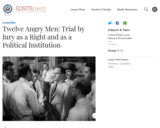
Twelve Angry Men, originally written for television by Reginald Rose in 1954 and subsequently adapted for stage (1955), film (1957) and television again (1997), effectively conveys the central importance of the right to a jury trial afforded by Article III of the Constitution as well as Amendments V, VI, and XIV. Focusing on the right to a trial by "an impartial jury of the State and district wherein the crime shall have been committed," the play/film also addresses related constitutional provisions, including the presumption of innocence until proven guilty and the right to counsel. More broadly, the play/film embodies the central insight of Alexis De Tocqueville in his classic work Democracy in America, that the jury system is one of the most important political institutions for democratic self government. It educates citizens about the law and legal process, helps them understand their duties as citizens and in the best case, improves their deliberations as citizens.
How does "Twelve Angry Men" deepen our understanding of the constitutional guarantee of the right to trial by jury and the role of the jury system in American democracy?
To what extent does a trial by jury provide for equal protection under the law?
Analyze the Constitution to understand what the right to a trial by jury includes.
Analyze the causes and effects surrounding the Gideon v. Wainwright (1963) ruling.
Evaluate the extent to which a trial by jury ensures equal justice under the law.
- Subject:
- Civics and Government
- Social Studies
- Material Type:
- Formative Assessment
- Lesson
- Author:
- Christine L. Compston
- Date Added:
- 06/03/2023